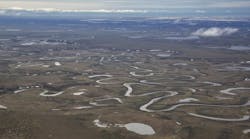Nick Snow
Washington Editor
The US Chamber of Commerce issued a study on Mar. 10 that identifies 351 stalled energy projects it says costs the US economy $1.1 trillion in gross domestic product and 1.9 million jobs yearly, which it says could be created during the projects' construction phases alone.
The first-of-its-kind report did not include oil and gas beyond LNG terminals and gas utilities. But its findings probably will seem all too familiar to oil and gas firms facing government regulatory delays.
"The numbers would have been much higher if oil and gas projects had been included," William Kovacs, the Chamber's senior vice-president of environment, technology, and regulatory affairs, told OGJ following a briefing on the report.
"We decided not to because so many variables can be involved, starting with how much of the resource can be economically produced," he explained. "We concentrated on electric utilities because we were more comfortable measuring kilowatts."
The report may significantly underestimate new US energy projects' economic benefits as a result. "For example, we omitted Shell Oil Co.'s Alaska Outer Continental Shelf [program] which was estimated to create 35,000 jobs over the next 50 years in the development and extraction of up to 65.8 billion bbl of oil and 350 tcf of natural gas," it says.
'Same roadblocks'
The study by TeleNomic Research was conducted by Steve Pociask, president of the American Consumer Institute, and Joseph P. Fuhr, an economics professor at Widener University in Chester, Pa., and an ACI senior fellow. Its most notable finding may be that 45% of the delayed projects it found involved renewable energy. "Cleaner energy projects are hitting the same roadblocks as gas, oil, nuclear, and coal," it notes.
Peter Morici, a former International Trade Commission chief economist who peer-reviewed the study, said it's actually proenvironment as a result. "You can't get involved in any new energy projects without opposition from the not-in-my-back-yard and no-growth groups," he observed.
The report necessarily provides a nearly year-old snapshot because of the time it took to assemble the information. Updates are available online at www.projectnoproject.com. One is San Diego Gas & Electric Co.'s Sunrise Powerlink 1,000-Mw line from Imperial Valley geothermal sources to the San Diego area. Kovacs said that opposition to it dates back to the 1980s.
"It's not just these 351 projects," he said. "The problem crosses American society. The permitting process needs to be coordinated so good projects can move into the marketplace and bad ones can be killed."
It's too soon to say if renewable energy projects being blocked will create new regulatory reform alliances, however, Kovacs told OGJ.
More Oil & Gas Journal Current Issue Articles
More Oil & Gas Journal Archives Issue Articles
View Oil and Gas Articles on PennEnergy.com

